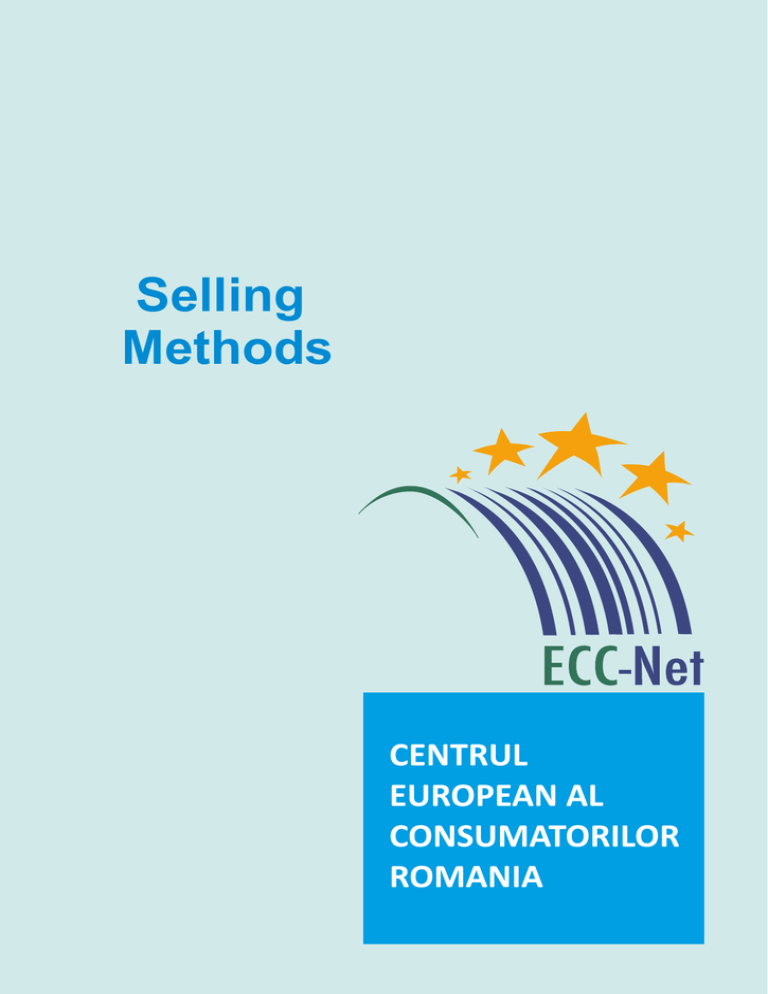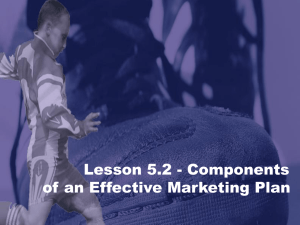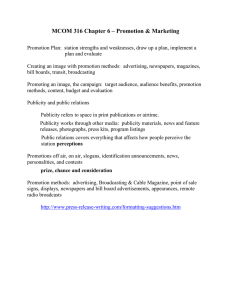Selling Methods
advertisement

Selling Methods Selling methods Direct selling, distance selling, liquidation, sales, price reduction, it isn't easy to handle yourself among them, but it is good to know for each of them there are rules offering protection to consumers. Selling methods By the place where the selling is done and by the way the parties are present physically, simultaneous in the same place, there are several selling methods: A. Selling inside commercial spaces It is the most common type of selling, when the products and services are sold inside specific spaces and the parties are physically present, simultaneous in the same place. B. Distance selling Is a form of selling performed in the absence of simultaneous physical presence of the consumer and the professional, after a buying offer made by the latest, who, in order to conclude the contract, uses exclusively distance communication techniques. For this type of selling there are special rules – please see the Infosheet “Distance selling”. C. Direct selling Is a commercial practice where products and services are sold by the professional directly to the consumers, outside commercial spaces, using direct sellers that present the products and services for buying. Direct selling examples: · Network selling (multilevel marketing) is a direct selling form where products and services are offered to consumer through a network of direct sellers receiving commissions for their own sales, but also for selling through the networks they generated by personally recruiting other direct sellers. · Door to door selling are direct selling made by professionals in the following situations: a) during a trip organized by the professional outside his commercial spaces; b) during a visit made by the professional, if it wasn't asked for specifically by the consumer: - at the living place of the consumer, where contracts can be concluded with other persons also; - at the consumer's workplace or where the consumer finds himself temporarily, for work, study or treatment reasons; c) in any other public places or destined for the public, where the professional presents an offer for his products or services, in order to be accepted by the consumer. Also for this type of selling there are special rules – please see the Infosheet “Door to door selling”. Price reduction selling Are considered as price reduction selling: · Liquidation selling; · Sales; · Selling made in factory stores or deposits; · Promotional selling; · Selling of products destined to satisfy an occasional need of the consumer, after the event has passed and it's obvious the same products cannot be sold in normal commercial conditions; · Selling of products which after 3 months they were purchased by the professional were not sold; · Accelerated selling of products that are susceptible to rapidly deteriorate or that cannot be conserved until their validity expires; · Selling of products at a price that is the aligned to the legal price of other professionals from the same commercial area, for the same product, determined by the competition; · Selling of products with identical characteristics, which have lower prices at the producer. A. Liquidation selling Liquidation selling is any selling that was preceded or accompanied by publicity and announced as “liquidation” and which, through a price reduction, has as effect the accelerated selling of the whole or of only one part of the professional's stock, in one of the following situations: · When the professional has definitively stopped his activity; · Interruption of the seasonal commercial activity for at least 5 months after the liquidation is over; · Changing the profile of the store, suspension or replacement of a commercial activity that was conducted in the same place; · Selling the product stock by the dead professional's inheritors; · Serious deterioration through calamities or vandalism of a part or the whole stock of products. · Etc. Liquidation selling must be notified on the basis of a detailed inventory of the merchandise. The professional must notify the local authorities. Any announcement or any other publicity form regarding liquidation selling must specify the start date and the duration of the selling and the type of merchandise that is sold. During the liquidation selling can be sold only products inscribed in the inventory list when the notification was made. B. Sales Sales is any selling accompanied or preceded by publicity and announced as “sales” and which, through a price reduction has as effect the accelerated selling of the seasonal merchandise stock. The sales can only be made during two yearly periods, with a maximum duration of 45 days each. The sales must be made inside the selling structures where the products were usually sold. The sales periods are established by the professional inside the following limits: · 15 January - 15 April, for autumn – winter products; · 1 August – 31 October, for Spring – Summer products. Any announcement or any other form of publicity regarding sales must specify the start date and the duration of the selling and the type of merchandise that is sold. C. Selling made in factory stores or deposits Selling made in factory stores or deposits are made from directly by producers from their own production. This type of selling must not be notified. The producers can sell at a reduced price any of their part of production that complies with the following conditions: · Hasn't been offered before to selling due to production defects; · Has been returned from the commercial network; · Is the stock of the production for the previous season which has not been sold. E. Promotional selling Promotional selling can be done in any moment of the year, without any notification, on the condition that: · Is not made with a loss; · Is done for available products; · The products and services must exist for selling for the whole announced period. Are not considered as promotional selling: · Promotion actions made by producers; · Launch actions for products and services. Rules regarding price reduction Any professional announcing a price reduction must refer it to the reference price applied in the same commercial space for identical products and services. The reduced price must be inferior to the reference price. The reference price is the lowest price applied in the same commercial space in the last 30 days before the price reduction. Any price reduction announcement, regardless the form, publicity, reduction reason, must indicate in numbers a reduction comparing it with the reference price, with the exception: · Comparative price publicity; · Publicity announcement not holding numbers; · Price announcements for the launch of a new product; · Oral publicity announcements inside a store, for a very short period during a day. Catalogue publicity and price reduction offers, launched by professionals that sell through correspondence, can only be valid until the stocks are finished, with the condition this mention is visible and easy to read in the catalogue. Any price reduction announcement in absolute value or percentage must be made in a visible, non equivocal and easy to read way for each product or group of identical products: · By mentioning the new price next to the old one, barred; · By mentioning “new price”, “old price” next to the corresponding amounts; · By mentioning the reduction percentage and the new price that appears next to the old price, barred. It is forbidden to present a price reduction to the consumers as a free offer for a part of the product or the service. Other types of selling A. Publicity lottery The publicity lottery is a promotion practice trying to stimulate for the participants the hope for a win by draw. The publicity lotteries are only admitted when the participants are not asked for a direct or indirect expense, additional to the product purchase. The normal communication expenses – post, telephone, etc. – are admitted. Regarding the gains, the announcements presenting a publicity lottery will have to present the nature, number and commercial value of these gains, as the following mention: “the participation regulation can be obtained freely by any participant”. For this an address and telephone number where the request can be made are provided. The regulation will specify the obligation of the organizer to publish the names of the winners and the gains. The regulation must be authenticated by a notary. B. Bonus selling Bonus selling is the commercial practice when consumers are offered, along with the product/service, immediately or at a specific date, a bonus under the form of products/services. It is forbidden any selling or selling offer that gives the consumer the right to a bonus in products/services identical to those bought. Are not bonuses: · Product package; · Products or services necessary for using in normal conditions the product or service; · Products or services that a value of up to 10% of the prices of products/services bought by consumers; · Personalized articles, respectively objects carrying publicity messages, which cannot be found as such in commerce; · Post sale services. C. Conditioned selling It is forbidden to condition the selling to the consumer of a product with the buying of another product or service. Also, it is forbidden to offer the consumer a service, conditioned by the necessity to buy another service or another product. Are not conditioned selling: · Selling different products and services at a global price, when the products and services make an ensemble, as well as in the case of identical pre-packaged products offered in a collective package, under the condition that: a) Each product and each service can be bought also separately; b) The buyer is informed on this possibility and on the price for the product or service. · Selling products in lots or packages according customs and consume needs. D. Forced selling Forced selling is: · Sending a product to a person, without prior order, asking him to buy that product or to return it to the sender, even without taxes, in case of refusal to buy; · Offering a service to a person, without prior order, asking him to accept the service by paying the price. Any forced selling is forbidden. Sending a product or offering a service to a person in done only on basis of a prior order. Are not forced selling the offers made for charitable ends. In the case of such offers, on the documents it shall be written “the receiver has no obligation to pay or to return the product”. Legal base: Ordinance no. 99/2000 on selling products and services on the market, with the later revisions

